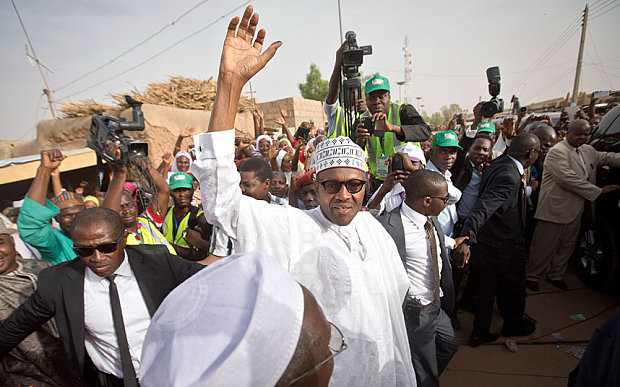Former military dictator Muhammadu Buhari has become Nigeria’s president elect after defeating Goodluck Jonathan in the first democratic change of power ever in Africa’s most populous nation.
Mr Jonathan on Tuesday publicly conceded defeat, expressing his gratitude for the opportunity to lead the nation.
“I promised the country free and fair elections. I have kept my word,” the 57-year-old said in a statement after the final results were announced with Mr Buhari some 2.57 million votes ahead.
Mr Jonathan’s defeat is the first time in Nigeria’s brief democracy that a sitting president has not won a second term or handed power to a nominated successor.
He urged disputes over the results to be settled in court, adding: “Nobody’s ambition is worth the blood of any Nigerian. The unity, stability and progress of our dear country is more important than anything else.”
 Supporters of the presidential candidate Muhammadu Buhari and his All Progressive Congress (APC) party celebrate in Kano (Reuters)
Supporters of the presidential candidate Muhammadu Buhari and his All Progressive Congress (APC) party celebrate in Kano (Reuters)
“This is the first time in Nigeria that a sitting government will be voted out of power using purely democratic means,” said Lai Mohammed, the senior spokesman for Mr Buhari’s All Progressives Congress party. “The people of Nigeria have taken over.”
Mr Buhari, 72, who ruled with an iron fist in the 1980s, had challenged Mr Jonathan over his record on fighting corruption and dealing with the Boko Haram insurgents who have killed an estimated 10,000 people across the country.
While Mr Jonathan has made some significant military gains over Boko Haram in recent weeks, it appears to have been too little and too late to convince voters, who gave his opponent bigger-than-expected majorities in many northern areas affected by the insurgency.
Mr Buhari was more than 2.75 million votes ahead of 57-year-old Mr Jonathan, after winning in the northern states of Yobe and Adamawa.
Mr Buhari’s All Progressives Congress (APC) won 21 states, while Mr Jonathan’s PDP was on 15, plus the Federal Capital Territory at Abuja.Borno state in northeast Nigeria, worst-hit by six years of Boko Haram violence, voted overwhelmingly in favour of opposition candidate Mr Buhari, who 94 per cent support.
In a contest that saw the two candidates level-pegging in the run-up to the elections, Mr Buhari also took the city of Lagos, Nigeria’s major commercial hub and home to an estimated 20 million people.
Mr Jonathan, by contrast, was punished by low turn-outs in his many of his own heartlands in Nigeria’s Christian south, where Mr Buhari took up to a third of the vote in some areas.
 Celebrations in Kaduna, Nigeria (Jerome Delay/AP)
Celebrations in Kaduna, Nigeria (Jerome Delay/AP)
“People are voting for Buhari because of allegations of corruption in the Goodluck government, and also the insurgency,” said Tahir Sherriff, a Nigerian journalist and political analyst. “There is the whole idea that people want to tell their rulers that they can’t be non-performing and expert to remain in office.”
Roughly 60 million of Nigeria’s estimated 170 million people were elegible to vote in the elections, the biggest democratic contest in Africa. Most will see the outcome as a verdict on Mr Jonathan’s lacklustre presidency, which was exemplified on the international stage by his tardy response to Boko Haram’s kidnapping of more than 200 schoolgirls from the north-eastern town of Chibok last April. Their whereabouts remain unknown.
Boko Haram had vowed to disrupt the vote in northern regions, and killed more than 40 people in random gun attacks during polling days. But overall, what was a formidably large and complex voting process went relatively smoothly.
 Goodluck Jonathan (EPA)
Goodluck Jonathan (EPA)
Both Britain and the US had warned on Monday of “disturbing indications” that the final vote count was being rigged, although they said it had not been “systemic” in favour of any particular party. While the British and American governments did not name which side they suspected was doing the rigging, Mr Jonathan’s appeared to take the comments as being directed at them. Femi Fani-Kayode, a spokesman for Mr Jonathan said: “We completely reject the assertion or the notion that we are in any way interfering”.
Foreign diplomats remain anxious about the possibility of post-election violence if Mr Jonathan’s camp disputes the legitimacy of the vote. While both sides pledged prior to the contest to respect the result and settle any disputes via the courts, there are fears of a repeat of the bloodshed after 2011’s election clash, in which Mr Jonathan defeated Mr Buhari.
Around 1,000 people died during rioting, mainly in the north. With a Buhari victory, however, those more volatile northern districts are likely to feel that their preferred candidate has won.







